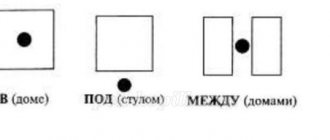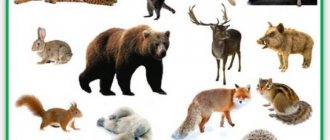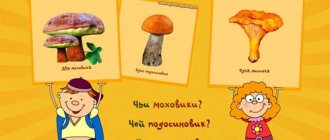Lesson on speech development in the middle group “Profession postman”
Lesson summary for the middle group Profession postman
Cognitive development:
Continue to introduce the profession of a postman, expand ideas about the necessity and benefits of his work, introduce people working at the post office to the attributes of their profession.
develop visual and auditory attention when the teacher talks about mail. Cultivate respect for the work of a postman.
Speech development:
Expand the vocabulary of words on the topic “Mail”, develop memory and thinking, continue to teach to actively participate in conversation, expand and concretize ideas about the work of the post office and postman, improve the grammatical structure of speech (formation of relative adjectives); activate children's speech activity.
Physical development:
Develop motor activity
,
improve coordination of movements.
Preliminary work:
reading the story by V.G. Suteev “Christmas tree” and the poem by S.Ya Marshak “Mail”;
making New Year's cards for children of the junior group "Teremok" didactic game "Professions". Vocabulary work:
postman, stamp, internet, telegraph, telegram, airmail.
Progress of the excursion.
- Surprise moment:
The teacher asks a riddle. He brought us a telegram: “I’m coming, wait, mom.” Brought a pension to my grandfather, Even though he’s not Santa Claus at all. He's been on his feet since dawn, Who is he? (Postman.)
The teacher invites the children to visit the postmen at the post office. So, it’s decided, you and I will go to the post office and send our greeting cards.
- Organizing time
The teacher invites the children to go visit the post office. So, it’s decided, you and I will go to the post office and send our greeting cards.
Guys, guess the riddle.
“I hang on the wall in blue and a lot of greetings are stored in me.” (Mailbox.)
- Reading a poem
Now I’ll put our postcards in the box. Letters to the mailbox are like birds, Flocking to hit the road. Some go to Moscow, and some go abroad, Just the address, my friend, don’t forget. And our postcards will go to the “Smile” kindergarten to the “Teremok” junior group. Let's go to the post office and meet the postal workers.
Simulation of walking to the post office. The children approach the table; two children dressed as postal workers sit at the table and there is a mailbox nearby.
This is ours, the Solnyshko post office. Wonderful people work here: the head of this communications office is Ekaterina and the postman is Rimma.
4. Conversation “What is mail for?”
- What do you think mail is for? (Children's answers) (People need mail so that they can contact other people, congratulate relatives and friends on the holiday with a postcard or telegram, tell in a letter about themselves, about their family, about interesting events. You can also send a parcel, subscribe to interesting magazines , newspapers. And before the New Year holiday, postmen have a lot of work. They are Santa Claus's assistants and they need to have time to deliver the holiday mail. During the holidays there is more work at the post office... Trains are rushing, And planes are flying. Ships are sailing, And cars are running - Postal cargo Po they bring it to the world. During the holidays there is more attention at the post office... Congratulations are in a hurry, wishes are in a hurry. And without delay, Reliably and accurately, they must be delivered to the post office address.
5. Didactic game “Who needs what for work?”
6. Exchange of thoughts “How to send a parcel correctly”
The teacher invites the children to choose postcards to send by mail to their loved ones and friends. (You need to write to someone.) -You need to write the address: city or village, street, house number, name of the person you are writing to.
7. Solving problem situations
My grandmother had apples and she would like to send them to me for New Year. Apples won’t fit in a letter, what should I do (It needs to be sent in a parcel.) Large cargo is sent in a parcel. A parcel is a small or large box in which they put what they want to send.
—
How do they transport mail? (By car, by train, by plane.) Educator: Well done! How to call a car, train, plane in one word? (This is transport.) Guys, what are the computers for here? Children: Play. Educator: Maybe someone is playing. You can also write on the Internet - this is a new modern connection. Guys, let's go to another room. Here Rimma signs newspapers and magazines - whoever to take them to - and puts them in her large bag. Look how heavy it is. What color is the postman's bag? Blue. Educator: Correct. Both the postal machine and the postman's uniform are also blue. The difficult but very necessary job of a postman. In cold weather, in hot weather, and in rain, all newspapers, magazines and letters must be distributed. Honor and glory to the postmen, Tired, dusty Honor and glory to the postmen With a thick bag on their belt! Educator: Let's say goodbye to the wonderful postal workers and say “thank you” to them for their work. Children: Thank you! Goodbye!
7. Summary of the lesson
Topic: "Mail". Week from to Senior group. Teacher Korotkova O.V. Monday
Transcript
1 Topic: “Mail”. Week from to Senior group Teacher Korotkova O.V. Monday Cognition (familiarization with the world around you). “Who works at the post office?” Goal: To form in children an idea of the work of postal workers and the importance of their work. Develop children's creative abilities. Enrich your vocabulary with words: stamp, letter, postcard, parcel, mailbox, etc. Develop respect for postal workers Visual activity “Postman” Goal: Develop the perception of a person’s image. Learn to create in a drawing the image of a hero of a literary work. Practice drawing a person. Learn to convey your favorite literary image in a drawing (proportions of the figure, characteristic features of clothing, details). Strengthen the ability to draw with a simple pencil, followed by coloring with colored pencils. Physical education Purpose: To train children in walking and running in circles, changing the direction of movement and running in all directions; repeat balance and jumping exercises.
2 Outdoor game. “Hares” Goal: to develop motor activity, the ability to act on a signal, restrain oneself, perform expressive movements, and contribute to the formation of positive emotions in children. Didactic game “Professions” Goal: expand ideas about the work of adults, develop observation, attention, logical thinking. Role-playing game “Mail” Goal: to promote the development of a new plot, develop the ability to choose a role, develop the ability to fulfill one’s role to the end, cultivate partnerships, and develop sociocultural competencies. Recommendations for parents: show your child the correspondence that you take out of the mailbox: newspapers, magazines, letters, postcards, look at them with your child. Show your child a letter, postage stamp, envelope, telegram, read where the letter, telegram came from and tell how the letter and telegram got to your home from another city. Tuesday Cognition (FEMP) “Letters and postcards” Goal: continue to consolidate the ability to distinguish and name: circle, square, triangle; recognize these figures, despite the difference in color and size, develop the ability to put these figures together from parts. Pin
3 quantitative and ordinal counting, counting backwards, comparing numbers. Stimulate the development of children’s thinking abilities, curiosity, and the ability to complete what they have started. Outdoor game. “Sparrows” Goal: improve coordination of movements, develop motor skills, cultivate will, a sense of camaraderie, practice running in all directions. Didactic game “Say the other way around” Purpose: to teach how to select antonyms, to develop curiosity, attention, and memory. Role-playing game “Writing a letter to a friend” Goal: to promote the development of a new plot, develop the ability to choose a role, develop the ability to fulfill one’s role to the end, and cultivate partnerships. Recommendations for parents: teach children to count to 10, reinforce the concept of quantity, teach them to find objects of different shapes, develop ideas about how to make another from one shape. Develop the ability to count objects from a larger quantity according to a pattern and a given number. Wednesday Application “Holiday Card”
4 Goal: improve appliqué skills, harmonious combination of different techniques, develop eye, accuracy, fine motor skills. Physical education (outdoors) Goal: repeat walking and running between snow buildings; practice throwing snowballs at a target; repeat the game “Two Frosts” Outdoor game. “We are funny guys” Goal: to develop agility and running speed, attention. Didactic game “Correct the mistake” Purpose: to teach children to find and correct mistakes in the actions of people of various professions. Role-playing game “Collecting a parcel” Goal: expand the understanding of the work of the post office, promote the development of a new plot, develop the ability to choose a role, develop the ability to fulfill one’s role to the end, cultivate partnerships Recommendations for parents: You can develop children’s creativity in various ways, including by working with various materials, such as paper. The technique of working with paper can be different:
5 cutting and cutting, three-dimensional appliqué, mosaic, origami-style crafts, creating various volumes using paper-plastic techniques, paper rolling, trimming. Deft children's and adults' hands, as well as imagination, can lead children to an amazing country where they can learn and experience one of the most wonderful feelings - the joy of creation and creativity. Thursday Speech development “One day at the post office.” Goal: to continue to introduce the professions of postal workers and their work activities, teach how to compose a consistent story, and expand knowledge about objects that make human work easier. Physical education Purpose: to practice throwing a ball on the floor while walking on a gymnastic bench, to practice high jumps from a running start, to develop agility, to consolidate the skills of soft landing on bent legs.
6 Outdoor game. “Colored Cars” Goal: to develop motor skills, speed and attention, to teach to follow the rules of the game. Didactic game “Find who is hiding” Goal: to develop the ability to concentrate attention, to include parts into the whole. Role-playing game “Postmen” Purpose: to promote the development of a new plot, develop the ability to choose a role, develop the ability to fulfill the chosen role to the end, teach how to build from construction parts. Recommendations for parents: develop the child’s speech as a means of communication. Train children in the ability to combine a noun with an adjective, change words using a diminutive suffix, teach them to compose a consistent story based on personal experience. Friday Manual labor/design “Mailbox”. (construction from boxes) Goal: to develop fine motor skills, to form constructive activities when creating a mailbox, to consolidate the ability to work with paper and scissors, to introduce children to work.
7 Reading fiction. S. Marshak “Mail” Purpose: to generalize the idea of the work of postal workers, consolidate knowledge of home address and rules for writing a letter, teach children to perceive short literary works; explain unclear words; pose questions to the text, answer the questions posed. Outdoor game. “The Birds and the Cat” Goal: to develop motor skills, develop speed, agility, learn to move according to a signal. Didactic game “Say Which” Purpose: to learn to name the characteristics of an object using several definitions. Role-playing game “Opening a new post office” Purpose: to teach children to independently create a play environment. Develop the ability to transfer accumulated experience into the game, build a joint game, and perform several interrelated roles. Recommendations for parents: develop the child’s interest in visual arts. Enrich their sensory experience by developing their senses of perception: vision, hearing, smell, touch, taste; consolidate knowledge about the basic forms of objects and objects of nature, consolidate knowledge about various professions of people.




